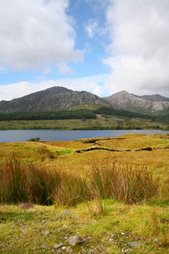Environmentalism can't succeed until it confronts the destructive nature of modern work—and supplants it
by Curtis White
Published in the May/June 2007 issue of Orion magazine
Last of a two-part series. See The Idols of Environmentalism for part one.
ENVIRONMENTALISTS SEE THE ASPHALTING of the country as a sin against the world of nature, but we should also see in it a kind of damage that has been done to humans, for what precedes environmental degradation is the debasement of the human world. I would go so far as to say that there is no solution for environmental destruction that isn’t first a healing of the damage that has been done to the human community. As I argued in the first part of this essay, the damage to the human world has been done through work, through our jobs, and through the world of money.
We are not the creators of our own world; we merely perform functions in a system into which we were born. The most destructive aspect of our jobs is that in them we are mere “functionaries,” to borrow Josef Pieper’s term. Just as important, we have a function outside of work: consumption. Money in hand, we go into the market to buy the goods we no longer know how to make (we don’t even know how to grow and preserve our own food) and services we no longer know how to perform (frame a house? might as well ask us to design a spaceship).
Challenging our place in this system as mere isolated functions (whether as workers or consumers) is a daunting task, especially for environmentalists, who tend to think that human problems are the concern of somebody else (labor unions, the ACLU, Amnesty International, Habitat for Humanity, etc.). We’re about the “Earth first.” My argument is simply that the threats to humans and the threats to the environment are not even two parts of the same problem. They are the same problem. For environmentalism, confronting corporations and creating indignant scientific reports about pollution is the easy stuff. But these activities are inadequate to the real problems, as any honest observer of the last thirty years of environmental activism would have to concede. The “last great places” cannot be preserved. We can no more preserve them than we can keep the glaciers from melting away. Responding to environmental destruction requires not only the overcoming of corporate evildoers but “self-overcoming,” a transformation in the way we live. A more adequate response to our true problems requires that we cease to be a society that believes that wealth is the accumulation of money (no matter how much of it we’re planning on “giving back” to nature), and begin to be a society that understands that “there is no wealth but life,” as John Ruskin put it. That is the full dimension and the full difficulty of our problem.
Unfortunately, on these shores the suggestion that there is something fundamentally destructive in work, money, and capitalism leads quickly to emotional denials. This is so even among self-described environmentalists, card-carrying members of the Sierra Club and The Nature Conservancy. So we try to persuade ourselves that capitalism can become green. I don’t believe that capitalism can become green, simply because the imperatives of environmentalism are not part of its way of reasoning. Capitalism can think profit but it can’t think nature. It’s not in its nature to think nature. What is part of its nature is marketing ("We’re organic! Buy us!"), even while its actions—industrial livestock practices that masquerade as Earth-friendly, for instance—are really only about market share, dividends, and stock value.
Capitalism as a system of ever-accelerating production and consumption is, as we environmentalists continually insist, not sustainable. That is, it is a system intent on its own death. Yet the capitalist will stoically look destruction in the face before he will stop what he’s doing, especially if he believes that it is somebody else whose destruction is in question. Unlike most of the people living under him, the capitalist is a great risk-taker largely because he believes that his wealth insulates him from the consequences of risks gone bad. Ever the optimistic gambler with other people’s money, the capitalist is willing to wager that, while there may be costs to pay, he won’t have to pay them. Animals, plants, impoverished people near and far may have to pay, but he bets that he won’t. If called upon to defend his actions, he will of course argue that he has a constitutionally protected right to property and the pursuit of his own happiness. This is his “freedom.” At that point, we have the unfortunate habit of shutting up when we ought to reply, “Yes, but yours is a freedom without conscience.”
Being willing to say such things about capitalism does not mean that one has a special access to the Truth, but it also doesn’t mean that one is a mere ideologue, or that most dismissible of things, a communist. It merely requires honesty about what looks us right in the face. It requires intellectual conscience. CONTINUE...


